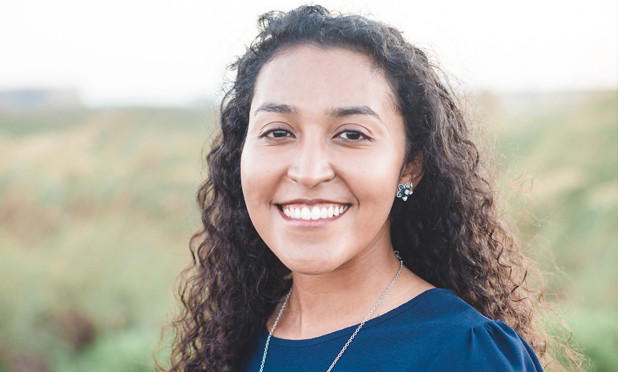 Recent graduate, Miranda Madrid was awarded one of eight Science Policy Fellowships by the Gulf Research Program (GRP) of the National Academies of Sciences, Engineering, and Medicine. Miranda graduated this summer with a master of science and presented her work on “Detecting and responding to change in the Mission-Aransas National Estuarine Research Reserve: Insights into the System-wide Monitoring Program” under mentor Dr. Edward Buskey. Miranda's experience combining biology with social science makes her well suited to begin her fellowship with the GRP, where she'll be working with the NOAA RESTORE Science Program.
Recent graduate, Miranda Madrid was awarded one of eight Science Policy Fellowships by the Gulf Research Program (GRP) of the National Academies of Sciences, Engineering, and Medicine. Miranda graduated this summer with a master of science and presented her work on “Detecting and responding to change in the Mission-Aransas National Estuarine Research Reserve: Insights into the System-wide Monitoring Program” under mentor Dr. Edward Buskey. Miranda's experience combining biology with social science makes her well suited to begin her fellowship with the GRP, where she'll be working with the NOAA RESTORE Science Program.
Beginning Sept. 1, 2021, Miranda and the other seven fellows will spend one year working in the Gulf states, directly serving state legislatures; state environmental, natural resource, oil and gas, or public health agencies; or regional offices of federal agencies.
Every year, policymakers in the Gulf region must make critical decisions on complex issues facing their states — whether it’s about water quality, coastal protection, offshore oil and gas safety, or fish and wildlife viability. During the fellows’ year of service, they will apply their scientific expertise and perspectives to ensure policymakers are making decisions based on the best available information; and to generate more knowledge to better inform future policy decisions.
“The Science Policy Fellowship is a win-win for fellows and their host organizations who come to this program with a big, structural challenge to solve,” said Karena Mary Mothershed, program head and senior program manager for the GRP’s Board on Gulf Education and Engagement. “These talented fellows gain valuable experience in the craft and process of policymaking. In turn, policy decision-makers gain access to excellent researchers, who help advance evidence-based policy for the benefit of communities in the Gulf.”
Fellows will work on a number of projects at the intersection of science and policy. These projects may include developing policy recommendations focused on affordable housing and climate resilience; leading community education and outreach regarding water and habitat quality; and bringing stakeholders together to promote environmentally safe agricultural practices, manage public lands in a balanced way, and reduce wildfire risks.
“This year’s class of fellows share a track record of excellence in research, a passion for communicating science to decision-makers and the public, and a commitment to incorporating equity and inclusion into their work,” said Maeesha Saeed, program officer and fellowships coordinator for the GRP. “We are so pleased with their talent and their passion for public service.”
Each fellow is paired with a mentor, who will work with them to develop their goals and a professional plan for the fellowship term. Throughout the fellowship year, fellows will have professional development opportunities to network, strengthen technical skills, and discuss relevant issues and share best practices across their respective organizations.
Now in its fifth year, the fellowship program has a network of 52 alumni. It supports the development of scientists from a range of scientific disciplines — including social and behavioral sciences, health sciences and medicine, engineering and physical sciences, and earth and life sciences. Alumni of the fellowship program have gone on to pursue promising careers at federal, state, and local government agencies, at nonprofit organizations, and as tenure-track professors.
Bios are available here. The eight recipients of the 2021 Science Policy Fellowships are:
Theodore Hilton
Ph.D. Candidate (Cultural Anthropology), Tulane University
Host Office: Environmental Protection Agency — Gulf of Mexico Division
Jordan Logarbo
M.S. (Renewable Natural Resources: Fisheries and Aquaculture), Louisiana State University
Host Office: National Oceanic and Atmospheric Administration (NOAA) — Atlantic Oceanographic and Meteorological Laboratory
Miranda Madrid
M.S. Candidate (Marine Science), University of Texas Marine Science Institute
Host Office: NOAA RESTORE Science Program
Jackson Martinez
M.S. Candidate (Marine Science), Virginia Institute of Marine Science
Host Office: Louisiana Office of the Governor — Coastal Activities
Blair Morrison
M.S. Candidate (Marine Science), University of South Alabama
Host Office: Florida Department of Agriculture and Consumer Services
Allison Snider
Ph.D. Candidate (Renewable Natural Resources), Louisiana State University
Host Office: Gulf Coast Ecosystem Restoration Council
Kirstie Tandberg Francis
Ph.D. Candidate (Integrative Biology), Florida Atlantic University
Host Office: NOAA — National Centers for Environmental Information
Matthew Varkony
Ph.D. Candidate (Environmental Science and Policy), University of Miami
Host Office: Tampa Bay Regional Planning Council
To learn more about the Gulf Research Program’s Science Policy Fellowships, visit nationalacademies.org/gulf/fellowships-and-grants/science-policy-fellowship.
The National Academies’ Gulf Research Program is an independent, science-based program founded in 2013 as part of legal settlements with the companies involved in the 2010 Deepwater Horizon disaster. It seeks to enhance offshore energy system safety and protect human health and the environment by catalyzing advances in science, practice, and capacity to generate long-term benefits for the Gulf of Mexico region and the nation. The program has $500 million for use over 30 years to fund grants, fellowships, and other activities in the areas of research and development, education and training, and monitoring and synthesis. Visit nationalacademies.org/gulf/gulf-research-program to learn more.
The National Academies of Sciences, Engineering, and Medicine are private, nonprofit institutions that provide independent, objective analysis and advice to the nation to solve complex problems and inform public policy decisions related to science, technology, and medicine. The Academies operate under an 1863 congressional charter to the National Academy of Sciences, signed by President Lincoln. For more information, visit nationalacademies.org.









